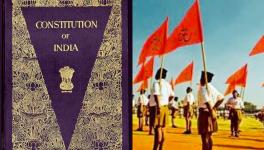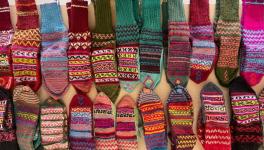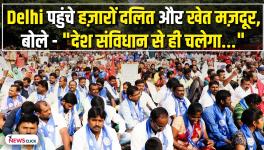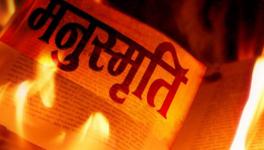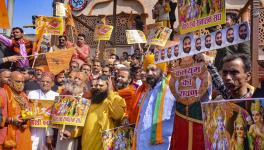It’s Himachal Now: Attack on Dalit Literature in the Name of Concern for Dalits
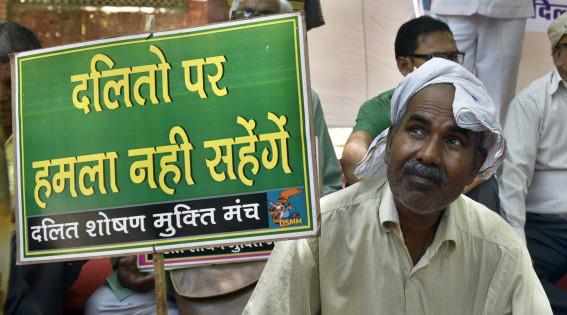
For representational purpose only | Image Courtesy: Sabrang
After the formation of the new government in Himachal Pradesh, people have been waiting for the usual announcements of the so-called pro-people policies. Immediately after being elected to the government, setting a few time-bound goals and trying to portray them as pro-people are the usual trend of bourgeois parties, but nothing of this sort has happened in Himachal Pradesh. Instead, the education fraternity has indulged in a planned attack against a book. The Dalit autobiography of Omprakash Valmiki, titled Joothan, was introduced in the undergraduate syllabus of Himachal Pradesh University three years ago when Rashtriya Uchchatar Shikhsa Abhiyan was launched, and this book has suddenly been propped up as contentious.
For the last three years, there has been no known problem with this noted autobiography, which is a renowned work of modern Dalit writing. Nobody knows how a teacher felt uncomfortable with the text and why the discomfort was raised with the Dalai Lama. The teacher’s accusation was that there are a few words derogating a particular caste in the text and that he feels uncomfortable to use them in the classroom. Students of Himachal Pradesh are trying to understand the relevance of raising the issue with the Dalai Lama instead of the education department of the state. The media, which has an eagle eye for sensational issues, immediately captured this news after one of the leading Hindi newspapers of Himachal Pradesh “cracked” it. The ABVP was quick to respond by demanding the removal of the book from the syllabus. NSUI, in its new form of soft Hindutva, was not far behind in raising their voice against this autobiography.
The attack on this book shows the nature of our society, which is not ready to acknowledge the evils of our society and proposes that by overlooking issues, they will be automatically solved. It is not the usage of certain words which refer to dalits in Joothan, but the stark portrayal of inhuman realities faced by dalit people across India which are reflected through the author’s own experience in the form of a resistance which is making the establishment uncomfortable. This revelation in literature is the actual reason for the attack on the book by those who are least concerned with the atrocities against dalits, and it is not the usage of certain words. Citing particular words as their concern for the dalit cause is only a strategy; their real intention is to remove this book (which itself is a symbol of dalit assertion) from the university syllabus. These are the same people who oppose reservation saying that there should not be any mention of caste as it promotes caste discrimination, but they will not work towards annihilating caste. On the contrary, they will strengthen caste by practising it in daily life. Omprakash Valmiki has described the situation of dalits in a very effective manner in Joothan. He has created the real picture of the inhuman conditions and humiliating treatment meted out against dalits through his autobiography. By expressing his own experiences, Valmiki succeeds in capturing the feelings of his readers.
For example, sharing one of the experiences of his school days the author writes,
“The third day I went to the class and sat down quietly. After a few minutes the headmaster’s loud thundering was heard: ‘Abey Chuhre ke, motherfucker, where are you hiding … your mother …’ I had begun to shake uncontrollably. A Tyagi boy shouted, ‘Master Saheb, there he is, sitting in the corner.’
The headmaster had pounced on my neck. The pressure of his fingers was increasing. As a wolf grabs a lamb by the neck, he dragged me out of the class and threw me on the ground. He screamed: ‘Go sweep the whole playground … Otherwise I will shove chillies up your arse and throw you out of school.’
Frightened, I picked up the three-day-old broom [now only a cluster of] thin sticks. Tears were falling from my eyes. I started to sweep the compound while my tears fell. From the doors and windows of the schoolrooms, the eyes of the teachers and the boys saw this spectacle. Each pore of my body was submerged in an abyss of anguish” (page 6).
This reflects the kind of atrocities that dalits face on a day-to-day basis, and the regressive upper caste thinkers have been attempting to deny these experiences. Basically, those people who are attacking Joothan claim to have issues with the word ‘Chuhra’,- a derogatory word used by the upper castes to refer to dalits - which finds mention in Joothan. They are providing the logic that such words are not in practice anymore and that they are abandoned by the law. This is a very mechanical argument. These words are not used by Omprakash Valmiki in a derogative manner, but to describe the real situation. Secondly, these words may be abandoned by law but they are definitely still in parlance in many parts of Himachal Pradesh and in India.
Another argument given by those people who are in opposition to this work is that the conditions of dalits - as described in Joothan - have changed. This is again far from the truth, and this tendency again shies away from accepting the bitter truth of society. This is the general character of a Brahminical society, which normally denies the existence of any kind of inequality in society and presents the society as good and noble. In Principle (only in words) they will speak for equality of all, but in practice they will be opposed to it.
Historically dalits have not been considered as human beings and the atrocities against them have been justified through the religious supremacy of the upper castes, and in contemporary times the existence of such caste atrocities itself is being denied. Even in Himachal Pradesh, which is otherwise quite different from other parts of the country on dalit and communal issue, strong caste biasness is being felt. There are various practices which not only discriminate against dalits but treat them differently in the social sphere. Inter-caste marriages are still a stigma. Even in Shimla (except Shimla town) dalits are not allowed inside the upper caste houses. If allowed, their entry is restricted only to the ground floor which is used for domesticating animals; no access to first floor is allowed which is inhabited by the family members. They are also served tea without milk. Besides these, more extreme forms of discriminations and social humiliation are practised in other districts of Himachal Pradesh.
We are aware of the kind of attacks against dalits that is on the rise in other parts of the country, especially over the past three years. The physical attacks find some space in the media, but more ideological attacks, which aim to remove dalit participation from social spheres, is not spoken about. The attack on dalit literature is a classic example of such efforts, in the garb of concern for dalits there is an attempt to remove an exemplary work of dalit literature which not only questions caste but also inspires many towards liberation.
We know that with the increasing attacks on dalits there is more resistance from dalits through mass mobilisations. These mobilisations are reflections of anger from dalit communities and it is posing a threat to the ideology of the BJP/RSS. This is the compulsion of democracy and the Constitution of India which provides equal voting rights to dalits and others that even the Manuvadi forces are compelled to talk about caste and social justice to attract dalit voters. It is not out of choice that they celebrate B R Ambedkar’s birth and death anniversaries, but such are the efforts to appropriate the icons of social justice who were essentially against the core Brahminical ideology of the RSS. But on various occasions their real agenda is exposed in public.
Joothan is not only a beautiful piece of literature, but a symbol of resistance. According to Namita Arora, who wrote a very effective review for Joothan, which won the top award in the 3 Quarks Daily 2011 Arts & Literature Contest, “Valmiki’s narrative voice brims with a quiet sense of outrage at what he had to endure as a human.” She says that she is inclined to see Omprakash Valmiki’s “memoir as a form of Satyagraha: in reflecting back to others their own violence and injustice, it attempts to shame them into introspection. This is the kind of book that becomes ‘the axe for the frozen sea inside us.’” On saying that, she notably adds that “more Indians ought to read it and let its hard edges get to work inside them”.
Joothan is a part of the syllabus in 13 universities across the country, including a few central universities, but none has a problem other than in the recently-formed BJP government in Himachal Pradesh. A review committee has been formed to look into the matter. This planned controversy in Himachal Pradesh has yet again exposed the real face of BJP state governments, where people with brahmanic agenda feel protected to work against dalits and tribals. Progressive people of the state and academics have to resist these efforts through their active protests.
Disclaimer: The views expressed here are the author's personal views, and do not necessarily represent the views of Newsclick.
Get the latest reports & analysis with people's perspective on Protests, movements & deep analytical videos, discussions of the current affairs in your Telegram app. Subscribe to NewsClick's Telegram channel & get Real-Time updates on stories, as they get published on our website.









